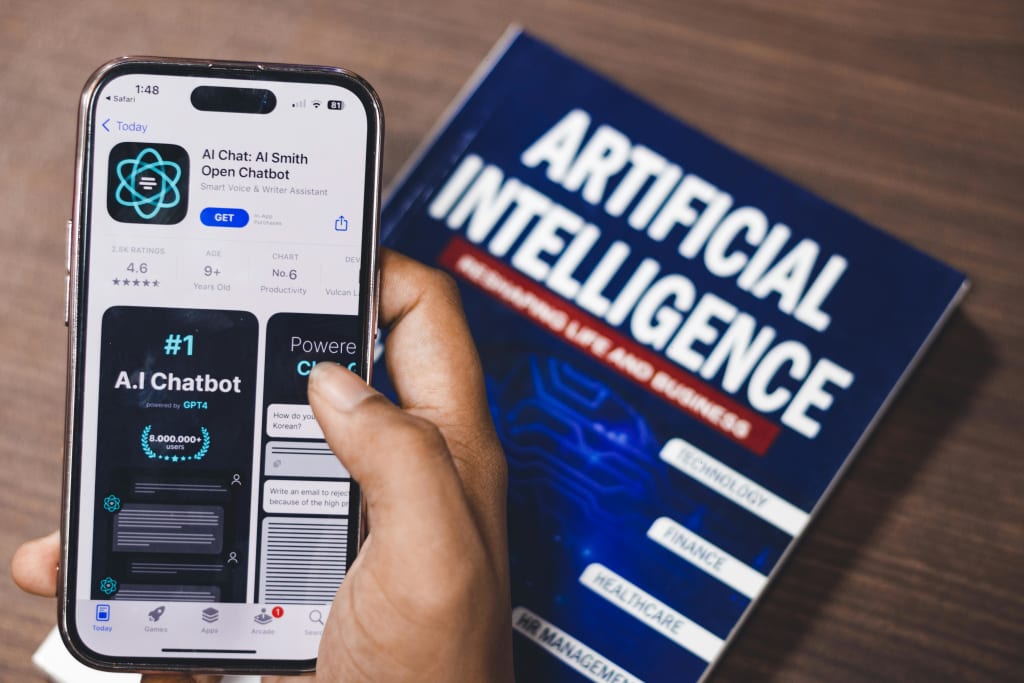How Artificial Intelligence (AI) is Transforming Healthcare
Innovations and Implications

# How Artificial Intelligence (AI) is Transforming Healthcare: Innovations and Implications
## Introduction
Artificial Intelligence (AI) is rapidly transforming the healthcare sector by enhancing the efficiency, accuracy, and accessibility of medical services. From predictive analytics and personalized medicine to robotic surgeries and virtual health assistants, AI applications are revolutionizing how healthcare is delivered and managed. This article delves into the innovations brought by AI in healthcare, the benefits and challenges, and the future prospects of AI in this critical industry.
## Understanding AI in Healthcare
### Core Principles and Technologies
1. **Machine Learning (ML)**: A subset of AI that involves training algorithms to recognize patterns and make predictions based on data. It is widely used in diagnostic imaging, predictive analytics, and personalized medicine.
2. **Natural Language Processing (NLP)**: Enables machines to understand and interpret human language. NLP is crucial for applications like automated transcription of medical records and patient interaction chatbots.
3. **Robotics**: AI-powered robots assist in surgeries, rehabilitation, and patient care, improving precision and efficiency in medical procedures.
4. **Computer Vision**: Allows computers to interpret and process visual data from the real world. In healthcare, it is used in diagnostic imaging and patient monitoring.
5. **Deep Learning**: A type of ML that uses neural networks with many layers to analyze complex data. Deep learning is particularly effective in analyzing medical images and genetic data.
## Innovations in AI for Healthcare
### Diagnostic and Imaging Applications
1. **Radiology**: AI algorithms analyze medical images such as X-rays, MRIs, and CT scans to detect anomalies with high accuracy. Tools like Google's DeepMind and IBM's Watson Health are leading in this domain.
2. **Pathology**: AI assists pathologists in examining tissue samples for diseases like cancer. Automated image analysis helps in identifying cancerous cells more quickly and accurately.
3. **Ophthalmology**: AI applications can diagnose eye conditions such as diabetic retinopathy and age-related macular degeneration from retinal scans.
### Predictive Analytics and Personalized Medicine
1. **Predictive Models**: AI can predict disease outbreaks, patient outcomes, and potential complications by analyzing large datasets. This allows for proactive healthcare management.
2. **Personalized Treatment Plans**: AI analyzes genetic, environmental, and lifestyle data to tailor treatment plans for individual patients, enhancing the effectiveness of therapies.
3. **Genomics**: AI accelerates the analysis of genetic data, helping in identifying genetic disorders and guiding gene therapy.
### Virtual Health Assistants and Chatbots
1. **Patient Interaction**: AI-powered chatbots provide 24/7 assistance, answering patient queries, scheduling appointments, and offering health advice.
2. **Mental Health Support**: Virtual assistants offer counseling and support for mental health issues, making mental healthcare more accessible.
3. **Chronic Disease Management**: AI assistants help patients manage chronic conditions like diabetes and hypertension by providing medication reminders and lifestyle tips.
### Robotics in Healthcare
1. **Surgical Robots**: AI-driven robots like the da Vinci Surgical System assist surgeons in performing minimally invasive surgeries with greater precision.
2. **Rehabilitation Robots**: These robots aid in the rehabilitation of patients recovering from strokes, injuries, or surgeries by providing consistent and personalized therapy.
3. **Patient Care Robots**: Robots assist in routine tasks such as delivering medications, monitoring vital signs, and even providing companionship to elderly patients.
### Administrative Applications
1. **Automated Medical Records**: AI automates the transcription and management of electronic health records (EHRs), reducing administrative burdens and improving accuracy.
2. **Billing and Coding**: AI streamlines medical billing and coding processes, minimizing errors and speeding up reimbursement cycles.
3. **Supply Chain Management**: AI optimizes inventory management, ensuring that medical supplies are available when needed and reducing wastage.
## Benefits of AI in Healthcare
### Improved Accuracy and Efficiency
1. **Enhanced Diagnostics**: AI improves diagnostic accuracy, reducing the risk of human error and enabling earlier detection of diseases.
2. **Faster Data Analysis**: AI rapidly analyzes vast amounts of data, providing timely insights that enhance clinical decision-making.
3. **Automated Routine Tasks**: AI handles routine administrative and clinical tasks, freeing up healthcare professionals to focus on patient care.
### Cost Reduction
1. **Operational Efficiency**: AI streamlines operations, reducing costs associated with manual processes and administrative overhead.
2. **Preventive Care**: Predictive analytics enable preventive care, reducing the incidence and severity of diseases, and lowering healthcare costs.
3. **Optimized Resource Utilization**: AI helps in the efficient allocation of resources, ensuring optimal use of medical personnel and equipment.
### Enhanced Patient Experience
1. **Personalized Care**: AI tailors treatments to individual patients, improving outcomes and patient satisfaction.
2. **Accessible Health Information**: Virtual assistants provide patients with easy access to health information and support, enhancing their engagement and compliance.
3. **Continuous Monitoring**: AI-powered devices monitor patients' health in real-time, allowing for timely interventions and better management of chronic conditions.
## Challenges and Ethical Considerations
### Data Privacy and Security
1. **Sensitive Information**: Healthcare data is highly sensitive, and its protection is paramount. Ensuring the privacy and security of patient data is a significant challenge.
2. **Data Breaches**: The healthcare sector is a prime target for cyberattacks. Robust cybersecurity measures are essential to protect AI systems and patient data.
### Bias and Fairness
1. **Algorithmic Bias**: AI algorithms can inherit biases present in the training data, leading to unfair or inaccurate outcomes. Ensuring fairness and equity in AI applications is crucial.
2. **Diverse Data Representation**: It is essential to include diverse datasets in training AI models to avoid biases and ensure they are effective across different populations.
### Regulatory and Legal Issues
1. **Compliance**: Navigating the complex regulatory landscape of healthcare is challenging. AI applications must comply with regulations such as HIPAA (Health Insurance Portability and Accountability Act) in the United States.
2. **Liability**: Determining liability in cases of AI errors or malfunctions is a legal challenge that needs to be addressed as AI adoption increases.
### Ethical Concerns
1. **Decision-Making Authority**: The role of AI in clinical decision-making raises ethical questions about the extent of AI's authority versus human judgment.
2. **Patient Consent**: Ensuring informed consent for AI-driven treatments and procedures is essential for maintaining patient trust and autonomy.
## Future Prospects of AI in Healthcare
### Technological Advancements
1. **Integrative AI Systems**: Future AI systems will integrate various data sources and technologies, providing holistic and more accurate healthcare solutions.
2. **Advanced Robotics**: Continued advancements in robotics will enhance surgical precision and expand the capabilities of rehabilitation and patient care robots.
3. **AI and IoT Integration**: The integration of AI with the Internet of Things (IoT) will enable more comprehensive and continuous health monitoring.
### Increased Adoption and Acceptance
1. **Wider Implementation**: As AI technologies become more accessible and affordable, their adoption in healthcare will increase, leading to broader benefits.
2. **Public and Professional Trust**: Building trust among healthcare professionals and patients is crucial for the widespread acceptance of AI. Transparent and ethical AI practices will be key.
3. **Education and Training**: Educating healthcare professionals about AI and its applications will facilitate its integration into clinical practice.
### Personalized and Precision Medicine
1. **Genomics and AI**: AI will play a critical role in advancing personalized medicine by analyzing genetic data to develop individualized treatment plans.
2. **Precision Public Health**: AI will enable precision public health initiatives, targeting interventions based on predictive analytics and population health data.
3. **Telemedicine and Remote Care**: AI-powered telemedicine platforms will enhance remote care capabilities, providing high-quality healthcare services to underserved areas.
## Conclusion
AI is poised to transform healthcare by improving diagnostics, enhancing patient care, reducing costs, and streamlining administrative processes. While the potential benefits are immense, addressing the challenges of data privacy, algorithmic bias, and regulatory compliance is crucial for the successful integration of AI in healthcare. As technological advancements continue and trust in AI grows, the future of healthcare will be increasingly shaped by intelligent systems that enhance the quality and accessibility of medical services worldwide.
About the Creator
Enjoyed the story? Support the Creator.
Subscribe for free to receive all their stories in your feed. You could also pledge your support or give them a one-off tip, letting them know you appreciate their work.





Comments
There are no comments for this story
Be the first to respond and start the conversation.